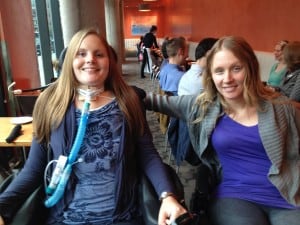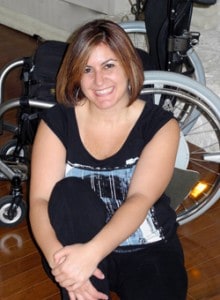
 What Nondisabled People Think When They See Us
What Nondisabled People Think When They See Us
It’s frustrating when nondisabled people see us and jump to conclusions, assuming they know exactly what our disability is and our limitations. I call these people “disability know-it-alls” and they drive me batty.
Others feel pity when they see us — a large number of people, in fact. This is the default emotional response for them, and I understand that, but people need to retrain their brains. It is time.
If you have a disability, what do you think when you catch people looking at you or staring at you in public? Are you used to it by now and completely unfazed, or do you still let it get to you? Some people with disabilities relish these occasions as an opportunity to educate the nondisabled, hoping to show them we can live “normal lives” too.
My friend, Jenni Taylor, a vent-dependent quad who I lunch with often, especially loves the opportunity to educate the public. “When they see me in the public ‘doing my thing’ and interacting, whether it be shopping, eating out or just hanging out with my family, they might see a different perspective,” she says. “Hopefully it lets them know that I live my life in every way possible and am not ‘sheltered’ or ‘hiding myself’ from the world. I enjoy inspiring others and showing that all things are possible.”
While we can’t control what nondisabled people think when they see us, the biggest thing we can do is inform the public that our lives are not as sad as they assume. That way, when they do see us out and about, hopefully their minds will be able to wander to the more positive side of things, and not dwell on the negative.
— Tiffiny Carlson, Spin 2.0 Blog, newmobility.com
 Yesterday I Cried
Yesterday I Cried
Pushing toward my bedroom, seeking refuge to allow the knot in my throat to dissolve through the tears building up in my eyes, I felt, for the first time in a long time, the anger I have suppressed for almost eight years.
The anger that has been the monarch of my daily life. Seclusion. Alienation. Impatience. Apathy. Intolerance. Insecurity.
What do I do?
Entering my bedroom, I saw my tennis shoes thrown in the corner. They stared back at me, “We need to be used.”
Oh, fuck you, running shoes.
I cried.
Through my window blinds, blue skies invited me to go outside and appreciate what is still left in the world for me to learn to enjoy. Something to love in lieu of running.
Fuck you, blue skies.
I hated myself for allowing a simple spinal cord injury to be the oppressor of my life. I scolded myself for believing I was the stereotypical person on wheels — the one who wastes away at home, uninterested, unfazed, uninspired and ungrateful.
I cried.
Today, the pain still lingers, but the tears have stopped. There are remnants of anger, but the majority of it has been replaced by a profound sadness. How could I have entertained for one second the thought that I was no longer good enough? I am sad for the time wasted — seven years and 10 months. I am grieving not the spinal cord injury but my yielding to the belief that I have been defeated and that my life is over.
Yesterday I cried. Today, I start practicing for my first marathon as a paraplegic.
Today, I step up to the challenge and begin to answer the question I made to myself the first 10 minutes after waking up from my coma:
Will I be as successful in a wheelchair as I have been on two legs?
Will I?
— Camile Araujo, www.camilearaujo.com
Support New MobilityWait! Before you wander off to other parts of the internet, please consider supporting New Mobility. For more than three decades, New Mobility has published groundbreaking content for active wheelchair users. We share practical advice from wheelchair users across the country, review life-changing technology and demand equity in healthcare, travel and all facets of life. But none of this is cheap, easy or profitable. Your support helps us give wheelchair users the resources to build a fulfilling life. |


Recent Comments
Bill on LapStacker Relaunches Wheelchair Carrying System
Phillip Gossett on Functional Fitness: How To Make Your Transfers Easier
Kevin Hoy on TiLite Releases Its First Carbon Fiber Wheelchair